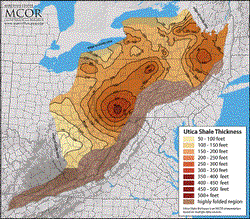 Reservoirs of natural gas in the Utica shale formation will be the focus of a free, Web-based seminar offered by Penn State Extension.
Reservoirs of natural gas in the Utica shale formation will be the focus of a free, Web-based seminar offered by Penn State Extension.
“Utica Reservoirs,” is part of a monthly series of one-hour webinars, to be held from 2:30 p.m. – 3:30 p.m. April 24.
According to presenter Mike Arthur, Penn State professor of geosciences and co-director of the Penn State Marcellus Center for Outreach and Research, the Utica Shale is the next “big” natural gas play in the Appalachian Basin.
“The Utica Shale has both advantages and disadvantages in comparison to the Marcellus Shale play,” he said. ” The Utica Shale and equivalents underlie an even larger area than the Marcellus Shale, but over much of the Appalachian Basin of Pennsylvania, the Utica Shale is deeply buried, overmature and generally not prospective for significant hydrocarbon production.
However, to the west — mainly the eastern half of Ohio — the Utica Shale is at the critical depth to yield natural gas, liquids and oil, according to Arthur.
“In that regard, the Utica Shale is presently of more interest than the Marcellus Shale because of favorable economic returns,” he said.
“This webinar will outline the geology of the Utica Shale as hydrocarbon source and reservoir, provide estimates for hydrocarbon reserves of different types, discuss the anticipated development of this resource and its implications for regional economics and environmental impacts.”
Presented by Penn State Extension’s Marcellus Education Team, the monthly natural-gas webinars usually are offered from 1 p.m. – 2 p.m. on Thursdays. Due to scheduling, this month’s webinar will be on a different day and time. Upcoming webinars will cover the following topics:
–May 16: Shale Energy Development’s Effect on the Posting, Bonding and Maintenance of Roads in Rural Pennsylvania — Mark Gaines, Pennsylvania Department of Transportation Bureau of Maintenance, Operations and Roadway Management, and Tim Ziegler, Penn State Larson Transportation Institute, Center for Dirt and Gravel Road Studies.
–June 20: Royalty Calculations for Natural Gas from Shale — Jim Ladlee, associate director, Penn State Marcellus Center for Outreach and Research.
Previous webinars, publications and information also are available on the Penn State Extension natural-gas Web site, covering a variety of topics, such as Act 13; seismic testing; air pollution from gas development; water use and quality; zoning; gas-leasing considerations for landowners; gas pipelines and right-of-way issues; legal issues surrounding gas development; the impact of Marcellus gas development on forestland; and stray shale-gas migration into groundwater.
Registration for this webinar is not necessary, and all are welcome to participate by logging in to https://meeting.psu.edu/pscems. For more information, contact Carol Loveland at 570-320-4429 or by email at cal24@psu.edu.


